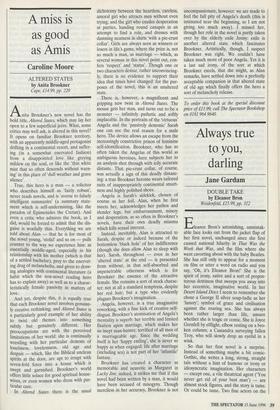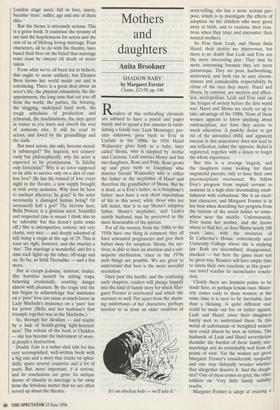Always true to you, darling
Jane Gardam
DOUBLE TAKE by Eleanor Bron Weidenfel4 £15.99, pp. 312 Eleanor Bron's astonishing, unmistak- able face looks out from the jacket flap of her first novel, unchanged since she first caused national hilarity in That Was the Week that Was, and the film where she went cavorting about with the baby Beatles. She has still only to appear for a moment on film or utter a word on radio and you say, 'Oh, it's Eleanor Bron!' She is the spirit of irony, satire and a sort of prepos- terous dottiness that sweeps you away into her eccentric, imaginative world. In her Desert Island Discs I seem to remember she chose a George II silver soup-ladle as her `luxury'; symbol of grace and civilisation against the roaring sea. She has always been rather larger than life, unsure whether she is tragic or comic. She is Joyce Grenfell by elflight, elbow resting on a bro- ken column; a Cassandra surveying fallen Troy, who will slowly drop an eyelid in a wink.
So that her first novel is a surprise. Instead of something maybe a bit comic- Gothic, she writes a long, strong, straight tale without a hint of humour or irony or idiosyncratic imagination. Her characters — except one, a vile theatrical agent (`You never get rid of your best man') — are almost stock figures, and the story is tame. Or could be tame. Two fine actors on the London stage meet, fall in love, marry, become 'stars', suffer, age and one of them dies.
But the theme is extremely serious. This is a grave book. It examines the tyranny of sex and the hopelessness for actors and the rest of us of lifelong loving marriage. Four characters, all to do with the theatre, have based their lives on the belief that marriage vows must be obeyed till death or never taken.
From what we've all been led to believe, this ought to seem unlikely, but Eleanor Bron knows her world inside out and is convincing. There is a great deal about an actor's life; the physical exhaustion, the dis- appointment, the long runs that cut you off from the world, the parties, the boozing, the slogging, underpaid hard work, the tough schedules of production and rehearsal, the machinations, the days spent in trance as you learn and absorb the soul of someone else. It will be read by actors, and loved by the groundlings and the stalls.
But must actors, she asks, become moral- ly submerged? She inquires, not censori- ously but philosophically, why the actor is expected to be promiscuous. 'Is fidelity only fortuitous?' Why is an actor supposed to be able to survive only on a diet of end- less love? He has his reward of love every night in the theatre, a new supply brought in with every audience. Why does he have to enchant wherever he goes? Is the actor necessarily a damaged human being? Or necessarily half a god? The heroine here, Bella Proven, is a glorious actor, beautiful and respected (she is meant I think also to be 'adorable' but this doesn't quite come off.) She is introspective, remote, not very chatty, very nice — and deeply ashamed of still being a virgin at the age of 29. This is soon set right, however, and she marries a `star'. The marriage is wonderful, and for a time each lights up the other, off-stage and on. So far, so Sybil Thorndike — and a few more.
But in creeps jealousy, mistrust, malice. She horrifies herself by setting traps, behaving irrationally, courting danger almost with pleasure. By the tragic end she has begun to acknowledge that insistence on a 'pure' love can cause as much havoc as Lady Macbeth's insistence on a 'pure' lust for power (Bella and her husband's first triumph together was as the Macbeths.) So, through her idealism — and maybe by a lack of health-giving light-hearted- ness? The refrain of the book is Chekhov — she has become the instrument of sever- al people's destruction.
Double Take is a rather slick title for this very accomplished, well-written book with a big cast and a story that cracks on splen- didly, spans several countries and a lot of years. But, more important, it is serious, and its conclusions are grim. Its antique theme of chastity in marriage is far away from the frivolous twitter that we are often served up about the theatre.



































































 Previous page
Previous page